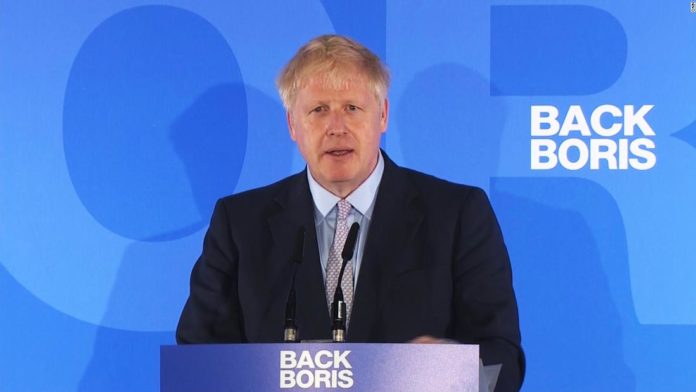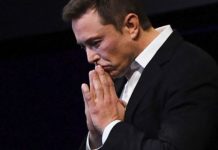But anyone who wants to be Prime Minister of the United Kingdom of Great Britain and Northern Ireland can’t avoid the media forever. So on Wednesday, in a packed conference room in London, Johnson emerged into the spotlight and officially launched his campaign to succeed May as leader of the governing Conservative Party.
“After three years and two missed deadlines, we must leave the EU on October 31. And we must do better than the current Withdrawal Agreement, which has been rejected three times,” Johnson said.
Such solid support for a no-deal exit was designed for the ears of the people who will choose Britain’s next Prime Minister — the 150,000 or so members of the Conservative Party, who are largely, old, white, and, well, conservative.
But part of his tactic is to appeal to all sections of the party — in particular some of the more moderate Members of Parliament whose support he needs in the initial stages of the contest. So Johnson clarified that he was “not aiming for a no-deal outcome,” merely that is was “responsible to prepare for it.”
And in a sign of what a Johnson negotiating strategy might look like, he said that taking no-deal off the table would rob the UK of an essential “negotiating tool” in getting concessions from Brussels.
Despite this lack of clarity on the most important question in British politics, the speech did nothing to quash the idea that this leadership contest is Johnson’s to lose.
But in the question and answer session that followed, Johnson reminded the media exactly how he might still wreck his own chances.
By staying out of the public eye, Johnson left the field open for other candidates to score spectacular own goals. One of his main rivals, Michael Gove, has spent much of the past week plagued by accusations of hypocrisy, after revealing that he had taken cocaine while working as a journalist.
Johnson has also in the past admitted using the same drug, but by avoiding public scrutiny for so long, has not been pressed on the issue. When asked about on Wednesday, Johnson sheepishly sidestepped the question: “I think the canonical account of this event when I was 19 has appeared many times and I think what most people in this country really want us to focus on is what we can do for them.”
This evasiveness stretched to a question on precisely how he planned to renegotiate the Brexit deal that May struck with the EU. Nor did he give any solid answers on how he would prepare the public for the possibility of a no-deal Brexit outcome.
And when pushed on controversial remarks he has made in the past, such as saying women who wear Islamic face veils look like “letter boxes,” Johnson brushed off the question with a comment about people being afraid to speak their mind on sensitive issues.
Yet despite this perceived slipperiness, Johnson remains streets ahead of his rivals. His message to the largely pro-Brexit Conservative base is a powerful one. All other serious rivals have given even flakier answers on what they would do as the October 31 deadline looms. Johnson, at least for now, is the only candidate with a chance of winning who is prepared to say that the UK will be out of the EU by November, one way or another.
Johnson’s supporters claim that his low profile strategy has been a sensible campaign move. They note that the frontrunner in these leadership contests seldom triumphs if they come racing out the blocks. But if keeping Johnson quiet is a campaign masterstroke, it comes with the grudging admission that this is a man who has a long history of gaffes.
But if Johnson’s detractors are to take him down, they will need to do better than merely to accuse him of being untrustworthy and evasive. The Conservative Pparty is losing support to Nigel Farage’s nascent Brexit Party, which openly advocates no-deal, and the pro-Remain Liberal Democrats. If repeated in a general election, this split would clear the path for the left-leaning Labour party to take the keys to 10 Downing Street and kick the Conservatives into the political wilderness.
Right now, all the opinion polls suggest that Johnson is the only person who can prevent electoral disaster for the Conservatives.
What does all this mean? Most significantly, a no-deal Brexit appears more likely by the day. It’s not just the Conservative base and their Brexit hero, Boris Johnson, who are gearing up for a no-deal showdown. In Brussels, EU officials are increasingly relaxed about their own preparation for the UK crashing out of Europe.
It’s not what they want, it’s not what the majority of the UK wants and, apparently, it’s not what Johnson wants. But with a new Prime Minister committed to leaving the EU at the end of October and an EU with little hope left of saving a Brexit deal, a no-deal creeps ever closer.
Source : Nbcnewyork












